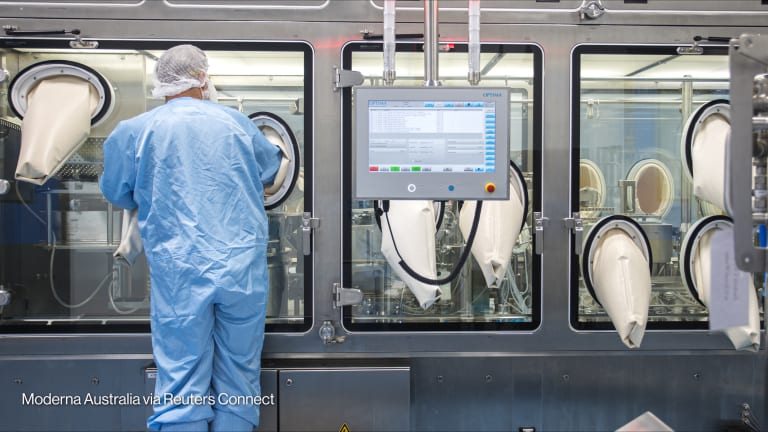
GABORONE, Botswana — A $100 million initiative launched this week that aims to expand next-generation genomic sequencing tools and expertise across the African continent, which experts say could be used to tackle disease outbreaks more effectively.
It comes amid concern that insufficient sequencing of SARS-CoV-2 in Africa could mean tools developed to fight the virus that causes COVID-19 are less effective there.
Partners in the four-year Africa Pathogen Genomics Initiative include the Africa Centres for Disease Control and Prevention, the Bill & Melinda Gates Foundation, and the U.S. Centers for Disease Control and Prevention, which are contributing both finance and technical assistance.
Meanwhile, private sector partners Illumina and Oxford Nanopore Technologies will provide in-kind contributions toward the next-generation sequencing machines, as well as training. Microsoft will provide technical assistance and resources to support the design and build of Africa PGI’s digital architecture.
The initiative aims to strengthen public health surveillance and laboratory networks across the continent by providing genomic sequencing tools, expertise, and training. Africa PGI will be part of the Institute of Pathogen Genomics, launched by Africa CDC in 2019.
By reading the genetic material of pathogens, genome sequencing enables public health specialists to track their evolution, identify mutations, and develop tailored vaccines and treatments.
“The opportunity for us to bring our genome technology, to bring sequencing, and to place it in the hands of these diverse communities ... is really a wonderful thing.”
— Leila Luheshi, associate director of clinical and translational research, Oxford Nanopore TechnologiesJohn Nkengasong, director of Africa CDC, said that the initiative will help the continent build its capacity in this area, reduce the burden of disease, and respond to outbreaks quickly and effectively.
“We want to network institutions already doing genomic sequencing so that they can support other countries quickly and use that to address any disease outbreaks that can occur,” he said.
Last month, Africa CDC launched a network of 12 specialized and regional reference laboratories to reinforce genome sequencing of SARS-CoV-2. The laboratories provide sequencing, data analysis, and other technical support services to countries in their subregions. But Dr. David Blazes of the Bill & Melinda Gates Foundation said Africa PGI aims to go beyond COVID-19 sequencing.
“COVID has accelerated the interest in this obviously, [but] it is not the only pathogen that is out there by any means. In many places, other diseases cause more morbidity and mortality. So while COVID is important, it’s also important to look to the other pathogens,” he said.
Dr. Phillip Febbo, chief medical officer at Illumina, said that Africa PGI will build on the sequencing of other pathogens that has already been done on the continent.
“We have seen incredible work already done in Africa prior to COVID-19 with Ebola and Lassa fever. … The reason we are so enthusiastic about this is it is building upon that early success [and] empowering more centers to get the technology [and] have access to training,” he said.
He added that the multistakeholder approach was necessary because “you need the sequencing companies like Illumina, like Oxford Nanopore; you need the data [companies] like Microsoft” and the convening power of organizations like the Gates Foundation and Africa CDC.
Thus far, genome sequencing has failed to gain traction in Africa mainly because of the high upfront costs, lack of infrastructure for data systems, and limited availability of public health experts trained in genomics. The initiative will address these challenges, Blazes said, but he added that there will still be other challenges to overcome, such as issues with data sharing and access to affordable reagents and supplies.
Strengthening Africa’s ability to ‘decode’ the coronavirus
Genome sequencing, used as a technique to track mutations in the coronavirus, can help to ensure that vaccines, drugs, or diagnostic tests work for different strains of the virus circulating globally.
Nkengasong said he hopes the initiative will enable the continent to harness the public health assets it has, including labs that are already doing pathogen genomic sequencing in countries including Senegal, Ghana, and Nigeria.
“Now the question then becomes: How do you network these institutions so that they can support other countries … [and] use that to address any disease outbreak that may occur or even to study existing pathogens?” he said.
Leila Luheshi, associate director of clinical and translational research at Oxford Nanopore Technologies, said the project will empower a diverse group of scientists, epidemiologists, and public health practitioners.
“We all know and understand that diversity and creativity are really key to scientific progress. … So the opportunity for us to bring our genome technology, to bring sequencing, and to place it in the hands of these diverse communities — each of which will have their own different needs and priorities but share this common interest in harnessing genomic technology — is really a wonderful thing,” she said.
Search for articles
Most Read
- 1
- 2
- 3
- 4
- 5








